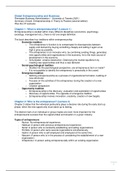Samenvatting
Global Entrepreneurship & Business Summary 2021 - All lectures & Book chapters!
- Instelling
- Universiteit Twente (UT)
Everything you need to pass the Global Entrepreneurship & Business exam on the University of Twente! This document contains a summary of the book 'Entrepreneurship in Theory & Practice' and also the part about finance, risks and internationalization as explained in the lectures. Alles wat je no...
[Meer zien]






